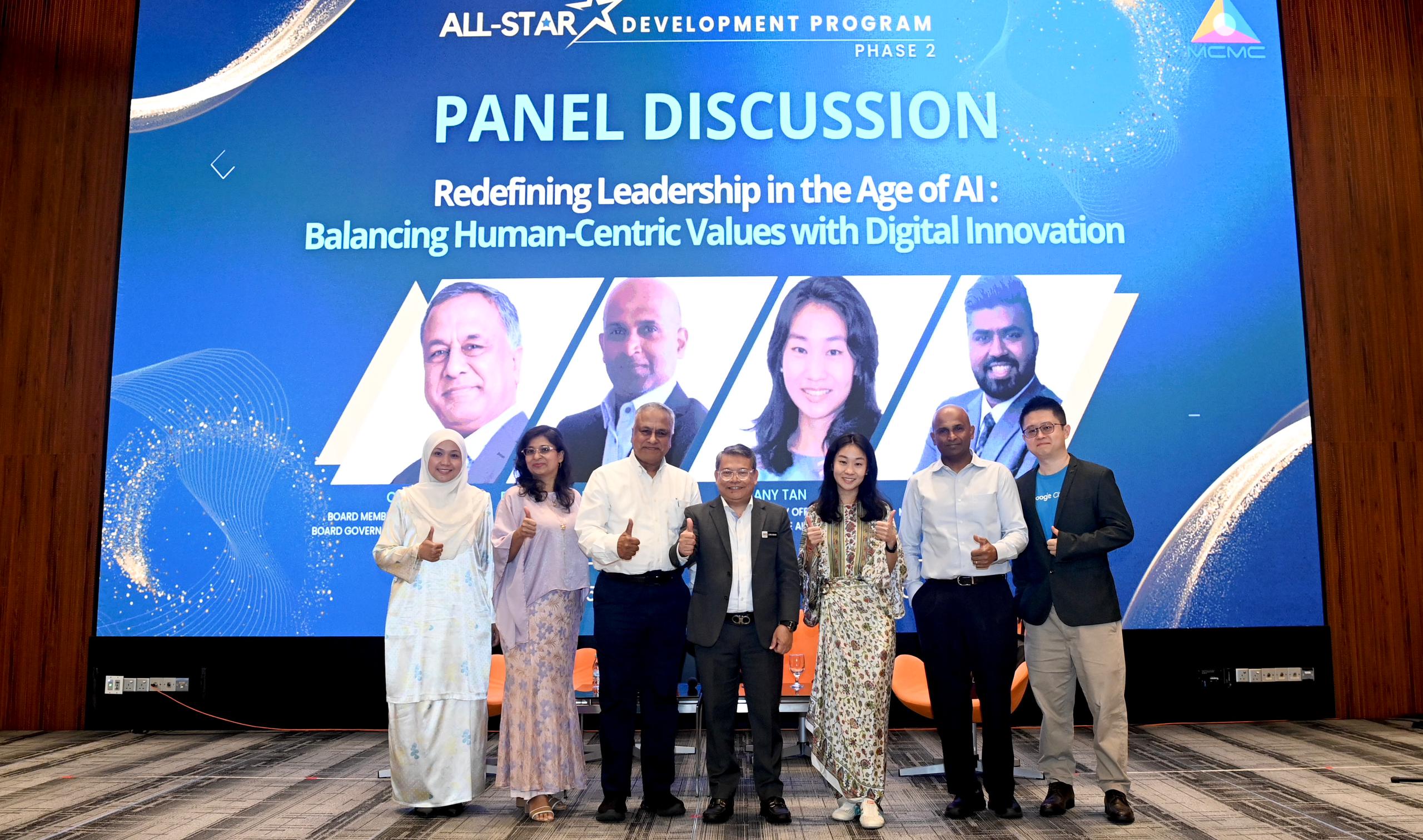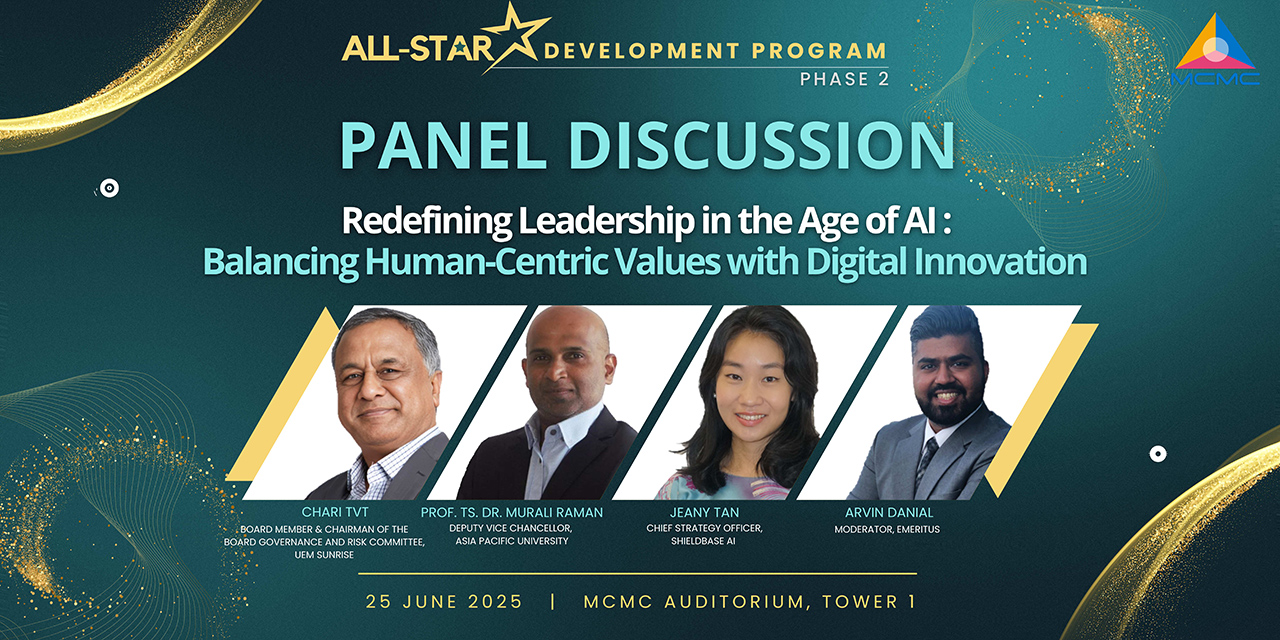In an effort to cultivate digital-ready leaders for the nation’s communications and multimedia sector, the Asia Pacific University of Technology and Innovation (APU) was recently invited by the Malaysian Communications and Multimedia Commission (MCMC) to share its leadership insights during a panel discussion held as part of the advanced Phase 2 of the All-Star Development Programme on 25 June 2025.
Co-designed with EdTech leader Emeritus, this phase forms a key part of a three-year initiative aimed at developing future-ready internal professionals at MCMC, and was marked by a flagship keynote and panel event at MCMC’s Cyberjaya headquarters.

Phase 2 gathered 49 tactical leaders who achieved 100% completion in this immersive, holistic programme, featuring courses curated under the digital themes offered by world-class universities. Next task: to explore how leadership must evolve as artificial intelligence reshapes the competitive landscape.
Reframing Leadership for the AI Era

Professor Ts. Dr. Murali Raman, Deputy Vice‑Chancellor (Academic Development and Strategy) at Asia Pacific University of Technology & Innovation (APU), joined a distinguished line‑up of panellists to tackle the theme “Redefining Leadership in the Age of AI: Balancing Human‑Centric Values with Digital Innovation.”
He spoke alongside Mr Chari TVT, Board Member and Chair of UEM Sunrise’s Governance and Risk Committee; Ms Jeany Tan, Chief Strategy Officer at Shieldbase AI; and Mr Kee Wooi Saw, Software & Customer Engineer at Google Malaysia. The discussion was expertly moderated by Mr Arvin Danial.
Drawing on more than two decades of scholarship and practice in digital transformation, Prof Murali argued that modern leadership has moved decisively away from command‑and‑control towards empowerment, collaboration and agility. “Digital tools have democratised information,” he observed. “Teams are no longer content to await instructions—they expect to co‑create solutions.”
He emphasised that successful leaders now build cultures of trust and transparency, ensuring every voice is valued. This inclusive approach not only accelerates innovation but also meets the expectations of a digitally native workforce. Panel colleagues concurred, noting that AI amplifies both the speed and the ethical stakes of decision‑making: leaders must be technologically fluent yet relentlessly human‑centred.
APU Insight: Driving Impact Through the All-Star Programme
Although the event was an internal leadership forum, the discussions left a lasting impact on participants. Prof Murali’s presence underscored APU’s broader commitment to shaping Malaysia’s digital future. His perspectives on leadership in the digital age sparked meaningful reflections on how to apply human-centred approaches in increasingly AI-driven environments, while also echoing the programme’s emphasis on building trust-based, adaptable leadership that aligns with the evolving needs of Malaysia’s digital ecosystem.
“True digital leadership fuses data‑driven insight with empathy, integrity, and an unwavering focus on societal benefit. When those elements align, Malaysian innovators can compete—and lead—on the world stage,” said Prof Murali.
The quote encapsulates APU’s brand promise: technological excellence coupled with values‑based leadership. The panel discussion reinforced the programme’s aim—to cultivate future-ready leaders equipped with both strategic foresight and people-first values, which are critical for steering organisations in a rapidly transforming communications and multimedia sector.
Looking Ahead to Phase 3
With Phase 2 completed, the All‑Star Development Programme now progresses to Phase 3, where participants will deepen their ecosystem thinking and design sustainable digital strategies for the communications and multimedia sector.
Prof Murali’s contribution leaves a clear message: Malaysia’s future competitiveness depends on leaders who can wield AI responsibly while inspiring diverse teams to innovate at pace. Through initiatives such as MCMC’s All‑Star Development Programme—and with guidance from thought leaders like those at APU—the nation is steadily building the talent it needs to thrive in a rapidly digitising global economy.
In reaffirming APU’s role at the forefront of this journey, Prof Murali added: “We will continue to collaborate with industry and government to ensure our graduates are not just job‑ready, but future‑ready—leaders who see technology as a force for inclusive growth.”
As the next cohort prepares for its own immersive challenges, the lessons from Phase 2 serve as both a blueprint and an inspiration: in the age of AI, leadership excellence is measured not by how much technology one commands, but by how profoundly one uplifts people through that technology.
News & Happening
Download e-Brochures
Intake Calendar
Want to know more ?
Let’s Connect